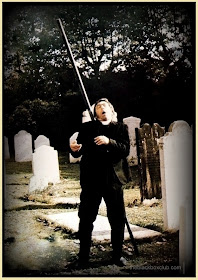Sam Neill
(Damien Thorn), Lisa Harrow (Kate Reynolds), Rosanno Brazzi (Father De
Carlo), Don Gordon (Harvey Dean), Barnaby Holm (Peter Reynolds), Lekeen
Willoughby (Barbara Dean)
PRODUCTION:
Director:
Graham Baker, Screenplay: Andrew Birkin, Producers: Harvey Bernhard
& Mace Neufeld, Photography: Robert Paynter, Music: Jerry
Goldsmith, Special Effects: Ian Wingrove, Makeup: Fred Williamson,
Production Design: Herbert Westbrook. Production Company:Mace
Neufeld/20th Century Fox. USA. 1981.
SYNOPSIS:
It is 1982
and a 32 year-old Damien Thorn, now the head of the Thorn Corporation,
is offered the post of Ambassador to Britain that was once held by his
father after the current ambassador commits suicide. Meanwhile, the
seven daggers of Meggido make their way into the hands of a group of
priests. The priests come to England to kill Damien but fail in their
attempts as the demonic powers protecting Damien arrange spectacular
accidents. A new Star of Bethlehem, heralding the Second Coming of
Christ, appears. Astronomical triangulation shows the new Christ to have
been born in England. Damien, drained in strength by the baby’s
presence, orders his minions to kill every baby born on the night of the
star’s appearance.
COMMENTARY:
General opinion holds The Final Conflict, the third film in the series that began with The Omen (1976), to be the worst of the four. To the contrary though, I found The Final Conflict in some ways to be the most interesting of all the Omen films. To be fair to its critics, The Final Conflict has a wealth of problems, mostly in the screenplay. As with the previous sequel, Damien: Omen II
(1978), it fails to pick up the grand conceptual challenge of imagining
the Biblical end of the world and keeps up delivering a conveyor belt
of novelty deaths. The set-piece killings become more contrived than
ever – the most ludicrous being one where a priest falls from a gantry
in a tv studio, gets caught upside-down with his leg in a cable, and is the set on fire as he swings over a shorting wire.
Moreover, the
final denouement, which merely has Damien stabbed in a church, is a
wimpy disappointment that lacks any of the grandly promised
confrontation between good and evil – if the producers had splashed out a
little more money and filmed the Book of Revelations as written they could have made Star Wars
(1977) as a 60s LSD exploitation film and blown everyone’s minds.
Indeed, the script here is so shabbily slung together it has not even
done its Biblical reading and has to invent non-existent books of the
Apocrypha to deliver prophetic quotes from.
Continuity with the other films is lacking too – the first film established Damien as being born on June 6th, 1966, but The Final Conflict
has him at the age of 32 in 1982. Similarly, the first film established
that it is necessary to have all the seven daggers placed in the shape
of a cross to kill Damien; this one has the monks using them one apiece.
On the other hand, The Final Conflict
has a good deal on its plus side – there is another fine Jerry
Goldsmith score and the film is directed with cleanly elegant visual
flair by Graham Baker. Best of all, this entry gives the character of
Damien stature, placing him centre stage. In fact, the film does so too
successfully – the representatives of good seem a bunch of complete
no-hopers. Sam Neill, in his first Hollywood starring role, plays Damien
with dark shining charisma, lacing the evil with a seductive
persuasion. The script gives Sam Neill some magnificent soliloquies on
the power and purity of evil, which come across with a disturbing
sympathy.
The other Omen films are:– The Omen (1976), Damien: Omen II (1978) and Omen IV: The Awakening (1991). The Omen (2006) was a remake of the original.
The Final Conflict was the directorial debut of British director Graham Baker who has gone onto make a handful of other films within the genre:– Impulse (1984), a fine little-seen drama about a biospill inducing mass insanity in a small town; the human-alien buddy cop film Alien Nation (1988); and Beowulf (1999), based on the classic legend.
Source: Richard Scheib
Images: Marcus Brooks



























































